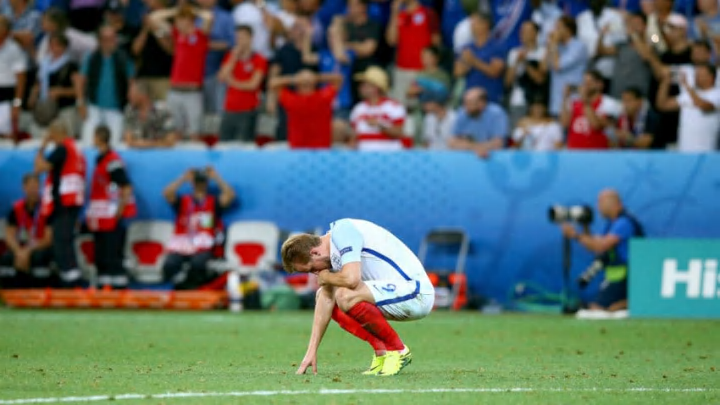England’s 2-1 loss to Iceland in the Euro 2016 Round of 16 will rightly go down as an utter disaster, and many will be blaming Tottenham.
No one expected a tremendous amount out of England this summer. While they were full of potential and some of the best players in the Premier League, they were also the youngest squad in the tournament. A relatively easy group heralded maybe a quarterfinal run before the Three Lions inevitably came up against one of Europe’s heavier hitters.
To lose to Iceland — the 47th ranked national team in the world (per FIFA) — is another matter altogether. This a country that has roughly the population of Leicester. Their top flight league is only semi-professional. However scrappy and determined their football might have been, England’s overall quality should have shined through.
But it didn’t, just as it hadn’t against Slovakia last week and for long stretches of the matches against Wales and Russia before that. Roy Hodgson’s team were about as inspired as one imagines Hodgson to be inspiring, which is to say not very much. Their build up play was questionable, their finishing and defense more so.
What advantages they did have — Tottenham’s Danny Rose and Kyle Walker at full-back, for instance — were almost all negated by deficiencies elsewhere on the pitch. Harry Kane tried and failed to find his rhythm through the three matches he started. Hodgson’s choice to start Wayne Rooney in midfield defied explanation. Joe Hart was a liability in goal.
More from Europa League
- Spurs projected XI at Mura, rotation coming for Conte and Tottenham
- How did Tottenham do in the UEFA Europa Conference League draw?
- Competition for places a good thing for Tottenham Hotspur
- Tottenham opponent for Europa Conference League Playoff no pushover
- After Saturday results Tottenham Hotspur controls Europa League destiny
No stretch of play better exemplifies the complete and utter lack of skill/desire/will than the untold minutes that were spent casually passing the ball between the centre-backs and Eric Dier on Monday. Iceland might be willing and capable of sitting especially deep and blocking off routes through the midfield, but Dier and Rooney and Dele Alli looked exceptionally baffled as to how to overcome this. The latter two rarely dropped deep, and Dier seemed hesitant to take anything but the safest passes.
What passes did get forward were often punts, most often hazily aimed at Walker on the right flank. The Tottenham full-back’s struggles with crossing are well-documented, and it goes without saying that he did not find a remedy here. Rose, on the opposite flank, tried to have as much of an impact as he could but often found himself isolated.
Hodgson’s odd refusal to implement the 4-3-1-2 formation he used in pre-tournament friendly slightly baffles. Not only would that have allowed England more control of the center of the pitch, it would have meant that Alli or Rooney would have at least been played in their ideal position just behind the strikers. The insistence that they operate in midfield often meant that Dier was far away from support both in and out of possession.
Autopsying tactical decisions doesn’t exactly strike at what will inevitably become the most popular criticism in the coming days: Tottenham ruined England. Those five players were the heart of the team, and therefore responsibly for its failure — or so the reasoning will likely go. Their presence in this squad forced decisions on Hodgson that otherwise might not have been had he relied on more veteran players like Jack Wilshere, Jordan Henderson and James Milner.
There’s some truth to that. Milner deserved a spot in the starting XI, perhaps in place of Alli. He’s a veteran with a long track record of success in midfield and on the wing.
Ultimately, though, you can’t blame Hodgson’s reasoning. Those five Tottenham players were some of the best in the Premier League last term. Imagine the criticism he would have gotten had he not included them.
Next: Tottenham Needs a Backup Central Midfielder for Dembele
Moreover, when Hodgson did experiment with benching the bulk of Tottenham’s contingent against Slovakia, England still played poorly. Their problems are a lot deeper an the teamsheet, and ultimately the Football Association will rightly make Hodgson himself a scapegoat for this disaster.
Whomever replaces him should not look on this tournament as reason to give up on Tottenham. Mauricio Pochettino is breeding a new generation of England players. The five that went to France will continue to grow and mature and be ready to make up for this disappointment and more when 2018 comes around.
